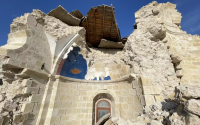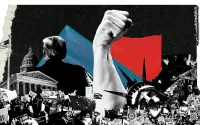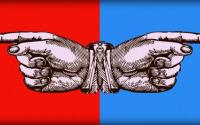Common Dreams / Published on Tuesday, December 19, 2006 by truthdig
Israel has spent the last five months unleashing missiles, attack helicopters and jet fighters over the densely packed concrete hovels in the Gaza Strip. The Israeli army has made numerous deadly incursions, and some 500 people, nearly all civilians, have been killed and 1,600 more wounded. Israel has rounded up hundreds of Palestinians, destroyed Gaza’s infrastructure, including its electrical power system and key roads and bridges, carried out huge land confiscations, demolished homes and plunged families into a crisis that has caused widespread poverty and malnutrition.
Civil society itself—and this appears to be part of the Israeli plan—is unraveling. Hamas and Fatah factions battle in the streets, despite a tenuous cease-fire, threatening civil war. And the governing Palestinian movement, Hamas, has said it will boycott early elections called by Palestinian Authority President Mahmoud Abbas, done with the blessing of the West in a bid to toss Hamas out of power. (Remember that Hamas, despite its repugnant politics, was democratically elected.) In recent days armed groups loyal to Abbas have seized Hamas-run ministries in what looks like a coup.
The stark reality of Gaza, however, has failed to penetrate the consciousness of most Americans, who, when they notice the Israeli and Palestinian conflict, prefer to debate the merits of the word “apartheid” in former President Jimmy Carter’s new book, “Palestine: Peace Not Apartheid.” It is a sad commentary on the gutlessness of the U.S. press and the timidity of the Democratic opposition that most Americans are not aware of the catastrophic humanitarian crisis they bear so much responsibility in creating. Palestinians are not only dying, their olive trees uprooted, their farmland and homes destroyed and their aquifers taken away from them, but on many days they can’t move because of Israeli “closures” that make basic tasks, like buying food and going to the hospital, nearly impossible. These Palestinians, after decades of repression, cannot return to land from which they were expelled. The 140-plus U.N. votes to censure Israel and two Security Council resolutions—both vetoed by the United States—are blithly ignored. Is it any wonder that the Palestinians, gasping for air, rebel as the walls close in around them, as their children go hungry and as the Israelis turn up the violence?
Palestinians in Gaza live encased in a squalid, overcrowded ghetto, surrounded by the Israeli military and a massive electric fence, unable to leave or enter the strip and under daily assault. The word “apartheid,” given the wanton violence employed against the Palestinians, is tepid. This is more than apartheid. The concerted Israeli attempts to orchestrate a breakdown in law and order, to foster chaos and rampant deprivation, are on public display in the streets of Gaza City, where Palestinians walk past the rubble of the Palestinian Ministry of Interior, the Ministry of Foreign Affairs and the Ministry of National Economy, the office of the Palestinian prime minister and a number of educational institutions that have been bombed by Israeli jets. The electricity generation plant, providing 45 percent of the electricity of the Gaza Strip, has been wiped out, and even the primitive electricity networks and transmitters that remain have been repeatedly bombed. Six bridges linking Gaza City with the central Gaza Strip have been blown up and main arteries cratered into obliteration. And the West Bank is rapidly descending into a crisis of Gaza proportions. The juxtaposition of what is happening in Gaza and what is being debated on the U.S. airwaves about a book that is little more than a basic primer on the conflict reinforces the impression most outside our gates have of Americans living in a distorted, bizarre reality of our own creation.
What do Israel and Washington believe they will gain by turning Gaza and the West Bank into a miniature version of Iraq? How do they think people who are desperate, deprived of hope, dignity and a way to make a living, under attack from one of the most technologically advanced armies on the planet, will respond? Do they believe that creating a Hobbesian nightmare for the Palestinians will blunt terrorism, curb suicide attacks and foster peace? Do they not see that the rest of the Middle East watches the slaughter in horror and rage—its angry, disenfranchised young men and women determined to overcome feelings of impotence and humiliation, even at the cost of their own lives?
And perhaps they do see and understand all this. Israel and Washington probably do get the recruiting value of this repression for Islamic militants. But these Israeli attacks, despite the rage and violence they breed against Israelis and against us, also create conditions so intolerable that Palestinians can no longer reside on their land. More than 160,000 civil servants have not received full salaries for almost nine months. These government employees support families that number more than a million Palestinians. And a United Nations report states that more than two-thirds of Palestinians are now living below the poverty line. The unemployment rate is more than 50 percent. The Palestinian Foreign Ministry says 10,000 Palestinians have emigrated in the last four months and almost 50,000 others have applied to leave.
Israel, with no restraints from Washington, despite the Iraq Study Group report recommendations that the peace process be resurrected from the dead, has been given the moral license by the Bush administration to carry out what is euphemistically in Israel called “transfer” and what in other parts of the world is called ethnic cleansing. Faced with a demographic time bomb, knowing that by 2020 Jews will make up only 40 to 46 percent of the overall population of Israel, the architects of transfer, who once held the equivalent status in Israeli society of the Ku Klux Klan, have wormed their way into positions of power in the Israeli government.
Washington and Israel, I suspect, know the cost of this repression. But it is beginning to appear as though they accept it—as the price for ridding themselves of the Palestinians.
Israeli Prime Minister Ehud Olmert has installed in his Cabinet a politician who openly calls for the expulsion of the some 1.3 million Israeli Arabs who live inside Israel. Avigdor Lieberman’s “Israel Is Our Home” Party, part of Olmert’s governing coalition, proposes involuntary transfer in a region populated mostly by Arab citizens of Israel, shifting those people to a future Palestinian state that would include Gaza, parts of the West Bank and a small slice of northern Israel. All Israeli Arabs who continued to reside in the territory of transfer would automatically lose their Israeli citizenship unless they took a loyalty oath to the state and its Jewish symbols. The inclusion of Lieberman, the David Duke of Israel, into the Cabinet is an indication to most Palestinians that the worst is yet to come.
The debate over Jimmy Carter’s book, one that dishes up a fair number of Israeli myths about itself and states a reality that is acknowledged even by most Israelis, misses the point. The question is not whether Israel practices apartheid. Apartheid is a fond dream for most Palestinians. The awful question is rather will Israel be able to unleash a policy so draconian and cruel that it will obliterate a community that has lived on this land for centuries. There are other, far more loaded words for what is happening to the Palestinians. One shudders to repeat them. But unchecked, unstopped, the current wave of violence and abuse meted out to the Palestinians will echo down the corridors of history as one of the greatest moral and tactical blunders of the early part of this century, one that will boomerang on Israel and on us, bringing to our own doorsteps the evil we have allowed to be delivered to the narrow alleys and refugee camps in Gaza. When it was only apartheid, we had some hope.






